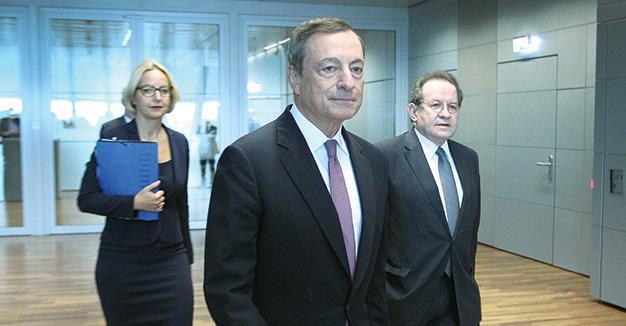ECB cites inflation-dampening euro rate as policy factor
FRANKFURT - Reuters
 The European Central Bank must take into account the weakening of inflation due to the strong euro as it prepares to wind down its unprecedented stimulus program, ECB chief Mario Draghi said on Sept. 7.
The European Central Bank must take into account the weakening of inflation due to the strong euro as it prepares to wind down its unprecedented stimulus program, ECB chief Mario Draghi said on Sept. 7.Draghi was speaking after the ECB kept rates at record lows and confirmed that asset purchases would continue at 60 billion euros ($71.76 billion) per month at least until December, suggesting a long-awaited tapering of stimulus could come more gradually than some market players currently anticipate.
That possibility was further reflected in the euro zone central bank’s move to trim inflation forecasts for next year and 2019, largely due to the euro’s 13-percent rally against the dollar this year on the back of a solid economic recovery.
“The medium-term outlook for inflation was revised downward in the staff’s projections, mainly due to the appreciation of the exchange rate, which means we will have to take account of this element of our information set in policy decisions,” Draghi told his regular news conference after the rates decision.
He added that there was now broad consensus within the ECB that currency volatility was a “source of uncertainty” in formulating monetary policy.
Underlining the dilemma faced by the ECB, the euro rose to a nine-day high above $1.20 as Draghi spoke.
Earlier, the bank left its guidance completely unchanged, even retaining the option of boosting asset buys if needed.
“If the outlook becomes less favorable ... the Governing Council stands ready to increase the program in terms of size and/or duration,” it said.
The key problem for the ECB in deciding whether to continue or wind down the asset purchases is that while growth is robust, inflation will remain under the ECB’s target of almost 2 percent for years to come given a sizable slack in the labor market and the absence of meaningful wage growth.
Draghi cited the strong euro as a reason for the lower inflation forecasts, with price growth now seen at 1.2 percent next year compared with 1.3 percent predicted in June and at 1.5 percent in 2019, down from 1.6 percent.
Though the ECB has preferred to tailor its message by the smallest of increments, time is running out for a decision as the scheme is due to end in December and the ECB has only two more rate meetings this year, on Oct. 26 or Dec. 14.
Draghi simply reiterated that policymakers would decide this autumn, adding: “Probably the bulk of these decisions will be taken in October.”
Hawkish rate-setters led by Germany argue that the scheme has reached its potential so it should be wound down. But “doves” say that a rapid exit could tighten financial conditions too much, undoing the program’s successes.
Analysts polled by Reuters predicted no policy change on Sept. 7 and expect bond buys to be cut by one-third in a decision later this year.
















